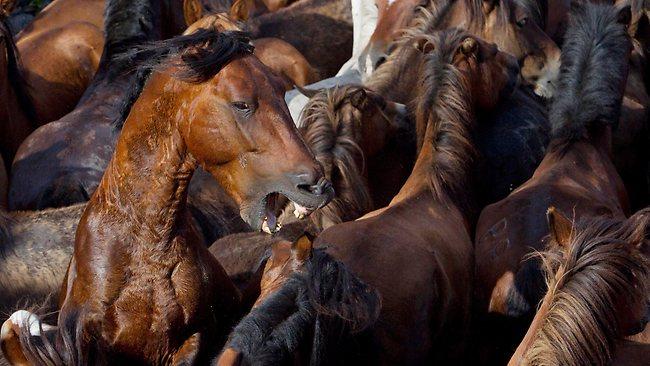Unsettled by the pain of Gillian Mears's fourth novel
GILLIAN Mears's prose has a nervy, thoroughbred grace that is evident in her long-awaited fourth novel, Foal's Bread.

MOST writers raise a lather getting words on the page. Their sentences are arduously worked and reworked until a suitably flowing and casually correct prose has been approximated.
Once the illusion of ease has been brought off, no one but the author need know of the effort invested in making it all look easy.
A few are different: they do not need to try. Sentences spin from their fingers like spiders' silk. Paragraphs tumble down the page as though gravity and not imagination was at work. The story told and the means of telling it are so entwined in these writers that we cannot extricate one from the other without doing violence to both. Our inadequate response to such facility is to call the author a stylist.
Gillian Mears's prose has a nervy, thoroughbred grace that surely places her in the latter category. Her long-awaited fourth novel more than matches earlier works such as The Mint Lawn (1991) and The Grass Sister (1995) in teasing poetry and sensuality from apparently coarse materials: in this case, a country family who farms a hard-scrabble patch of NSW's mid-north coast during the interwar decades of the 20th century.
The Nancarrows are ordinary folk made exceptional by their collective passion for showjumping, a lucrative and highly competitive feature, we learn, of the country show circuit at that time.
The land from which they gain a modest living has special qualities - steep hills and limestone deposits - that make it ideal for training horses. And in the years after World War I young Rowley Nancarrow goes from regional success to become national jump champion. He's blessed with a nimbleness that partly results from being struck by lightning as a boy. But he also has a sense of dash and ambition that are innate. The combination proves irresistible to an equally gifted young rider and the daughter of a local drover named Noah Childs.
The marriage of Rol and Noey Nancarrow is the central subject of Foal's Bread. It is a relationship whose triumphs and tragedies recall those dolorous acts of human endurance undertaken by the Pickles and the Lambs in Tim Winton's great working-class epic Cloudstreet. As with that novel, the Nancarrow marriage is shaped by the flawed character of its constituent selves. And as in Winton's work, Rol and Noey's lives unfold in an atmosphere of mildly magical realism: a numinous shimmer at the edges of the everyday.
What makes Mears so different to Winton, or to most anyone else in Australian literature for that matter, is her unembarrassed and rhapsodic concentration on sexuality. This novel opens with an unflinching and unsentimental set piece in which a 14-year old Noah gives birth one night, alone and outdoors while droving pigs, to an unexpected and unwanted child, the result of serial sexual abuse by an older family member:
When the wind picked up it seemed to go wild on that smell of blood. Bits of her sun-faded hair slipped free of its plait. In between the steep sides of pain, following her father's instructions, she put out the corn. She put her mind away, took one of the cobs still in its husk and bit down on that; kept it jammed in her mouth just the way she'd had to do with a block of wood when helping her father and uncle de-tusk the old boar.
Here is Mears's method in miniature: a frankly demotic prose, exquisitely turned to rendering narrative detail; and a conscious mingling of interior psychology with external world. Her language does not merely notate the extinction of the girl's conscious self ("she put her mind away") and its replacement by pure, elemental pain; it tangles word, image and sense so that everything, from the rising weather to the remembered boar, conspires to describe Noah's desperate inner state.
It is a breathtaking introduction. When Noah sets the still-living infant afloat in a butter box on a river less than a dozen pages in, we are left in no doubt as to her practical, resolute and tough-as-nails character (later, others will even find something metallic about her kisses). We also know that her decision not to murder the child there and then but instead give it some biblically slender chance for survival suggests that she will be haunted by her actions ever after. The drama that unfolds through the next 300 pages is a playing out across decades of the consequences of this act.
Fate, then, is given a starring role in Foal's Bread. The couple's second child and first son, George, is born autistic; and soon afterward Rowley Nancarrow is struck by lightning again. The blast slowly destroys his once legendary sense of balance and eventually his motor skills, along with his virility. So much of the couple's relationship is based on sexual passion, on their admiration for each other's jumping skills, that readers are shocked into empathy. We are brought into an uncomfortable proximity to what happens next.
Although Mears is careful to place her thumb on the scales, bringing happiness along with pain to the Nancarrows, it is the Job-like sufferings that stay with us. The scenes of violence, physical and psychological, visited on the couple are so unremitting and so vividly realised that they inspire voyeuristic shame as much as fascination. More than once I thought of Thomas Hardy, with his exact knowledge of and strong felling for the rhythm of rural life and his morbid sense of destiny.
The cumulative effect of these pages has none of the bucolic calm and cosmic indifference of Hardy, however. In its place we are offered an increasingly febrile and restless account: a universe unsettled by its inhabitants' pain. No one moment is settled on long enough for readers to gain a contemplative purchase on events; the years rush past in full flood.
A more pedestrian author would have no choice but to stop from time to time and consider the larger architecture of the fiction being undertaken; Mears plunges heedlessly on. And so, while Foal's Bread is evidently the product of deep research and long consideration, its story can appear breathless and overly urgent on the page. It feels unfair to observe of a novel that contains so much fine writing and that is buoyed up by such strong feeling that these qualities can be overwhelming when used unsparingly, like a fiery liquor taken straight.
But if it is true that the narrative has been allowed to go brumby, the ride is never dull. Mears writes with such minute appreciation of the landscape of the mid-north coast and with such love for her flawed creations that we are smitten alongside her.
It is a rare fiction, too, that lavishes such attention and care on the depiction of animals. The horses of Foal's Bread are so distinct in personality, talent and physicality that when, as occasionally happens, a human mistreats one, the reader aches to come to their defence. Only a writer of Mears's talent could so enlarge the circle of our sympathy by means of style alone.
Foal's Bread
By Gillian Mears
Allen & Unwin, 361pp, $32.99
Geordie Williamson is The Australian's chief literary critic and winner of the 2011 Pascall Prize for criticism.



